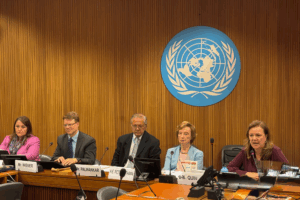 On 17 June 2025, the Geneva Centre for Human Rights Advancement and Global Dialogue, jointly with the Office of the High Commissioner for Human Rights (OHCHR) had the pleasure of hosting a side event on the margins of the 59th session of the UN Human Hights Council (UNHRC) which offered the perfect platform to draw UNHRC stakeholders’ attention to challenges and approaches to countering hate speech at the intersection of religion and gender. Given the increase in the latter, this event could have not been more timely to reflect on how to mobilise meaningful, inclusive, and gender-appropriate responses. Hosted at the United Nations in Geneva and co-chaired by Mr. Michael Wiener, Human Rights Officer OHCHR, and Dr. Umesh Palwankar, Executive Director of the Geneva Centre, more than 100 attendants could benefit from the extensive and lived experiences of three distinguished female experts in the field.
On 17 June 2025, the Geneva Centre for Human Rights Advancement and Global Dialogue, jointly with the Office of the High Commissioner for Human Rights (OHCHR) had the pleasure of hosting a side event on the margins of the 59th session of the UN Human Hights Council (UNHRC) which offered the perfect platform to draw UNHRC stakeholders’ attention to challenges and approaches to countering hate speech at the intersection of religion and gender. Given the increase in the latter, this event could have not been more timely to reflect on how to mobilise meaningful, inclusive, and gender-appropriate responses. Hosted at the United Nations in Geneva and co-chaired by Mr. Michael Wiener, Human Rights Officer OHCHR, and Dr. Umesh Palwankar, Executive Director of the Geneva Centre, more than 100 attendants could benefit from the extensive and lived experiences of three distinguished female experts in the field.
Speaking in her capacity as Permanent Representative of the Sovereign Order of Malta, H.E. Ambassador Marie-Thérèse Pictet-Althann stressed that women remain underrepresented in religious leadership and how religion is sometimes instrumentalised to justify gender inequality, distorting traditions rooted in compassion and justice. In its fieldwork from the Middle East to sub-Saharan Africa and Asia, the Order of Malta witnesses first-hand how conflict, displacement and marginalisation are intensified by both gender and religious bias. Grounded in the firm belief that faith can be a force for healing rather than harm, inclusion rather than exclusion, the Order of Malta advocates for intersectional strategies to tackle these overlapping forms of discrimination. To counter hate speech at the intersection of religion and gender, going beyond condemnation and acting collectively are the imperatives – partnering across sectors, listening to marginalised voices and equipping communities with the tools for peace.
The Deputy Director of UN Women in Geneva, Ms. Adriana Quiñones evoked the challenges posed by hate speech and its intersection with religious organizations that oppose gender equality, which obstructs the goals set by the Beijing Platform and Programme of Action (BPPA). Hate speech affects women’s ability to participate in decision-making and express themselves freely, particularly during humanitarian crises where their voices are often silenced. Women’s roles in communities must be considered fully, as increased hate speech and violence directly impact their political participation and economic empowerment. Women face hate messages in public life, it hinders their freedom to become leaders and participate in economic development and efforts to rein in the climate crisis. Along with a collective commitment to equality and non-discrimination, UN Women calls for collaboration with faith-based organizations for effectively implementing both the Beijing Platform and laws on violence against women; and a focussed approach in addressing social norms, connecting normative work with real-world impacts, and assessing progress in legislation.
Bringing the voice of the Baha’i International Community, Dr. Saba Haddad emphasized that women from minority faiths often face dual discrimination based on both their religion and gender, rendering them powerless. The advancement of women is crucial for peaceful societies, requiring the proactive involvement of all. Instead of viewing women as victims, women’s resilience and agency for change should be recognized, citing the Baha’i community in Yemen as an example where women empowered their communities amidst persecution. Empowering women empowers the entire community and families, necessitating prevention of persecution through transformation of individual mindsets and social norms. Equality of men and women is vital for humanity’s progress. Examples from India, Brazil, and the UAE show how communities are fostering social cohesion, shared identity, and unified action based on common values to combat hate speech and build peaceful societies.

Extending its most sincere thanks to the co-organizer, the panellists and the large audience, the Geneva Centre stands keen to work more closely with key stakeholders such as faith-based organizations, OHCHR and its Faith4Rights initiative, to pursue and broaden this open and inclusive dialogue for effective action in Geneva and beyond.